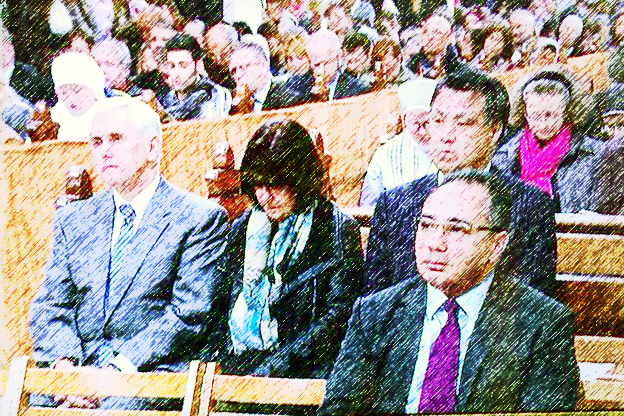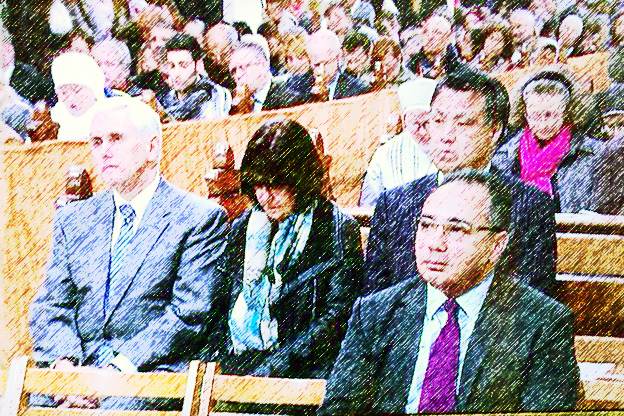Shalom Goldman | (Informed Comment) | – –
While US support for Israel has never been stronger (witness the 38 billion dollar aid package signed by the president in December) the perception among many in the US and Israel is that the Obama administration has been inimical to Israel’s best interests, and that the Trump team will be more ‘pro-Israel’ than any preceding administration. If the inauguration plans are any indication, ‘Israel advocates’ will be front and center at the inauguration and throughout Trump’s presidency
To some extent the differences between Obama and Trump on Israel are matters of rhetoric and style. While Democrats, having recognized and solidly backed Israel since the days of Harry Truman –and having developed the ‘special relationship’ (his words) under Jack Kennedy–speak of Israel in terms diplomatic and contractual, recent Republican administrations, influenced by the Christian Right, speak of Israel in terms tinged with religiosity.
Thus David M. Friedman, Trump’s choice for the next ambassador to Israel, referred recently to Jerusalem as “Israel’s eternal capital “–a phrase popularized by Netanyahu and his government officials. Hearing this from a man soon to be an American diplomat, I wondered whether the Trump appointee to the Quai D’orsay will refer to Paris as ” France’s eternal capital.”
In Washington a ‘biblical ‘ view of Israel has been developing for decades and I expect that pronouncements issuing from the new team at the White House will reflect this rhetorical trend. In the early 1980s, with the rise of the so-called “Moral Majority” and the election of Ronald Reagan, political rhetoric about Israel and the Middle East became tinged with scriptural references. Reagan spoke of ‘ Armageddon’ in more that one address, and according to historian Michael Oren (later Israeli ambassador to Washington) “Reagan in fact revered Israel…Raised in the restorationist-minded Disciples of Christ church and closely associated with pro-Zionist American evangelicals, he was religiously attached to Israel.”
And in case Reagan and his Republican successors slipped in their commitment to “biblical” Israel , and to the Israeli Right’s vision of a “Greater Israel “that included the disputed Palestinian territories, Falwell and his Religious Right colleagues were sure to remind them–and in tones that were themselves quite biblical. In 1982 Jerry Falwell told Ronald Reagan that the president had to be supportive of Israel and its policies. Why? “Because God’s attitude toward the nations is dictated by the nations attitude toward Israel.” Jerry Falwell died in 2007, but his son Jerry Falwell Jr, can be counted on to remind Trump of his responsibilities.
And while Trump actual opinions on any issue remain a mystery (an ‘eternal mystery ‘ perhaps) the political and social opinions of the Vice President-elect , Mike Pence, are well known. Especially when it comes to the US relationship to Israel. He has dubbed Israel “our most cherished ally.”
As I noted in a July , 20016 Informed Comment article:
In December 2014, Pence spent nine days in Israel on a Christmas pilgrimage sponsored by John Hagee’s Christians United For Israel. Katie Glueck, Politico’s astute correspondent, noted at the time that “Israel has become a routine stop for politicians with national ambitions,” and that the Indiana governor’s long sojourn in Israel was “a move sure to stoke speculation about his presidential ambitions.” While in Israel, Pence was invited to address a meeting of the Israel-America Chamber of Commerce. And here too he invoked the heartland image. “As governor from the heart of the heartland I say with conviction: Israel is not merely our strongest ally in the Middle East. Israel is our most cherished ally and a beacon of hope in a troubled region of the world.”
A few weeks ago the Israeli press leaked the news that the Trump team wanted Netanyahu to attend the inauguration. As of now this request is still under consideration by the Israeli government. And the Times of Israel noted that Trump is “aggresively pursuing Netanyahu ” to comply.
While Bibl may not be at the Washington extravaganza, he would no doubt approve of two Christian Zionist-identified ‘acts’ who will be there:
Two announcements this week by the Trump transition team are squarely on the side of “team Israel ” as understood by Netanyahu, Trump, Pence , David Friedman and others. Paula White, the prosperity gospel preacher chosen by Trump to lead a prayer at the inauguration, is an ardent Christian Zionist. She has spoken of her many visits to Israel over the past thirty years and last year invited members of her megachurch to join her on a tour of Israel that would enable them to “spiritually connect with your roots.” While inviting them to walk in the footsteps of Jesus, she did not display the humility one would think appropriate to the reference. She concluded the video ad for her tour inviting her followers to “journey with me and God.”
Joining Paula White and other Christian conservatives at the festivities is the Mormon Tabernacle Choir. Though over 35,000 people have signed a petition asking the choir to withdraw from the inauguration, the LDS Church has no plan to cancel the choir’s appearance.
The LDS Church is the original American Christian Zionist group. Its commitment to ” the return of the Jews to Zion” dates from the founding of the church by Joseph Smith in the 1830s.
Among the choir’s most popular albums is “Live In Jerusalem” which opens with a rousing rendition of Hatikvah, the Israeli national anthem (Now there’s an idea for the Washington extravaganza….). The albums’ cover photo is of the choir members assembled in front of the Dome of the Rock on Jerusalem’s Temple Mount/ Haram. One hopes that Trump’s choices for ambassadors to Arab and Muslim states know better that to give the album photo as gift to their diplomatic counterparts in their host countries.
Shalom Goldman is professor of religion at Middlebury College. He has authored numerous books, including Zeal for Zion: Christians, Jews, and the Promised Land and God’s Sacred Tongue: Hebrew and the American Imagination. His most recent book is Jewish-Christian Difference and Modern Jewish Identity.




 © 2025 All Rights Reserved
© 2025 All Rights Reserved